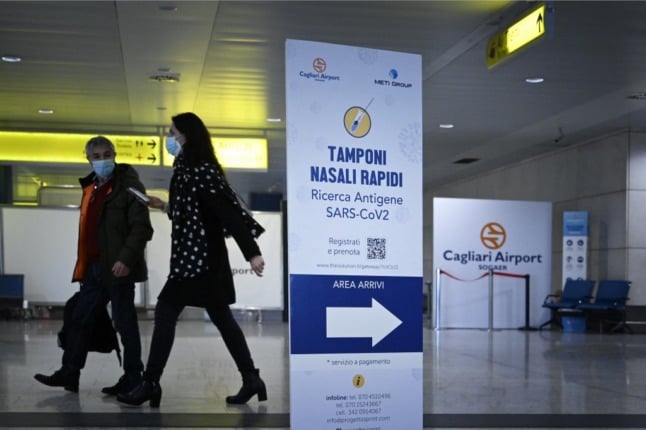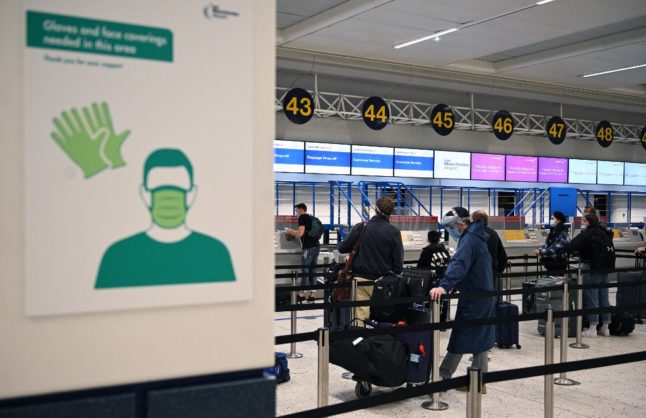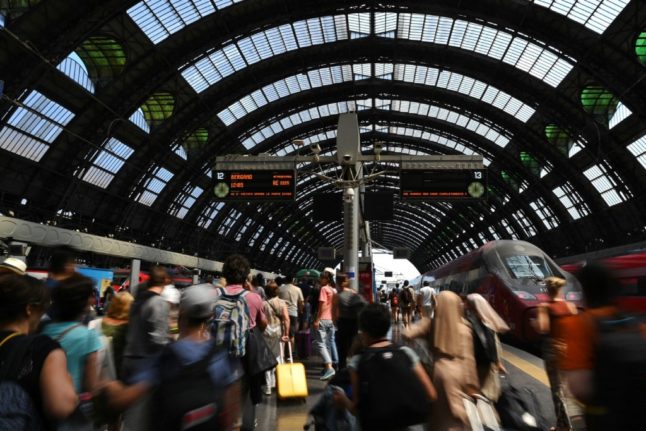Just as Italy scrapped its quarantine requirement for UK travellers on May 16th, the so-called ‘Indian variant’, a strain of coronavirus known as B.1.617.2, had begun to take hold in some parts of Britain.
The UK government has deemed it a “variant of concern” as it spreads quickly and is now known to account for half of all new infections in Britain, replacing B.1.1.7 (known in Italy as the variante inglese and in the UK as the Kent variant) as the dominant strain.
Reader question: What kind of coronavirus test do I need to take for travel to Italy?
According to the Gisaid database, the Indian variant has already been identified in over 30 countries on six continents.
In Italy, only 65 cases of the Indian variant have been detected so far. B.1.1.7 is still the dominant variant, now accounting for some 93 percent of cases in the country according to the latest government health monitoring report released last Friday.
However, Italy collects and analyses far less data on virus variants than the UK does, meaning that the picture in Italy is incomplete and it’s hard to compare data from the two countries.
So far in Italy only 1.11% of all positive swab tests have been sequenced to identify the strain, health data shows.

But, just like the UK variant, the new B.1.617.2 strain is expected to spread across the continent – and the world – before long and this has prompted concern that Italy might close its borders to British travellers again.
When the UK variant was first detected in late December 2020, Italy was among the first countries to impose tough restrictions on travel from Britain, initially blocking all flights and placing a blanket ban on entry to the country.
This time though, Italian ministers and health officials have so far said nothing about potentially imposing any new restrictions on travel from the UK.
MORE TRAVEL QUESTIONS:
- Which Covid vaccines will Italy accept for tourists this summer?
- What’s the latest on how the EU’s ‘Covid passports’ will work for travellers?
- What are the rules on driving between Italy and the UK right now?
Italian health officials at the moment appear confident that vaccines will be able to mitigate the impact of this and any other new strains of coronavirus.
Italian health undersecretary Pierpaolo Sileri told Radio 24 that he’s not concerned about the Indian variant for two reasons: “The first is that there is no evidence that it is resistant to vaccines, and the second, more general, is that research has made great strides in creating safe and effective vaccines.”
“Even if a variant emerged that could partially resist them, we would be able to respond,” he said. “I would say that the worst is really behind us.”
Though Italy’s vaccination campaign has accelerated in recent months, only around 18 percent of the population is fully immunized at the moment, the latest data shows.
And Italy has already banned travel from India, Bangladesh and Sri Lanka amid concern over the health situation in those countries.
The Italian health ministry will decide whether or not to change course on its approach to the variant from Friday, when the results of its latest survey of virus variants in the country are expected to be published.
How are other countries responding?
When the UK variant was detected last December, EU countries took a coordinated approach in an attempt to slow the spread, with the Italian health minister saying travel restrictions were needed while more studies on the new strain were carried out.
But this time, countries’ responses to the new strain have varied much more.
France on Wednesday placed tough new restrictions on arrivals from the UK over fears of the so-called Indian variant.
From Monday, May 31st, travel will only be allowed from the UK to France for essential reasons – with an exception for French citizens or people resident in France.
All arrivals will need to show a negative PCR or antigen test taken within the previous 48 hours (not 72 hours as was previously the rule) and are asked to self-isolate for seven days.
READ ALSO:
- Everything you need to know on travel rules between France and the UK
- Germany makes UK ‘virus variant area of concern’: How does it affect you?
- Spain clarifies: UK visitors will NOT need to show PCR test but will require health form
Germany decided on Sunday to close its borders to British travellers. Only German citizens or citizens resident in Germany can enter the country, and both categories will have to go through a 14-day quarantine, even with the negative PCR test.
“There are local outbreaks occurring again, including cases of more infectious variants such as the Indian variant at present,” said the German Embassy in the UK.
“Therefore, to prevent the further spread of the virus, the United Kingdom has been classified as an area of variant of concern.”
Meanwhile, Austria has also limited arrivals from the UK. Flights from the United Kingdom will no longer be allowed to land in from June 1st, and entry from the United Kingdom to Austria will only be possible to a limited extent and with a negative PCR test.
Spain on the other hand has removed all restrictions for British tourists. From May 24th, UK holidaymakers can visit Spain without the need to quarantine or present a negative PCR test result.
Spain will also allow all vaccinated travellers – regardless of their country of origin – to visit the country from June 7th.
“From June 7th, all vaccinated people and their families will be welcome in our country, Spain, regardless of their country of origin,” Prime Minister Pedro Sánchez said last week.
Spain has not yet confirmed which vaccines will be accepted other than those approved for use by Europe’s medicines agency.
Italy’s travel rules
While Italy hasn’t imposed any new travel restrictions on the UK, it hasn’t completely dropped them either.
In Italy the previous quarantine obligation for arrivals from the United Kingdom was lifted on May 16th.
UK travellers are required to show a negative PCR or antigen test taken within the previous 48 hours when arriving in Italy.
UPDATE: Who can travel to Italy right now?
Italy has not yet confirmed when it will allow vaccinated travellers to enter the country without restrictions, or any details of how its ‘green pass’ will work for international arrivals.
The EU is finalising details of its ‘digital green pass’ – while we don’t know exactly how this will work as yet, the principle is that each EU/Schengen zone country develops its own domestic app – which several countries already have, including France – and these can all be used to produce a QR code that can be scanned at any border within the Bloc.
The EU’s app will accept either a vaccination certificate or a recent negative test, or proof of having recently recovered from Covid.
Of course, Italy and most other European countries are currently on the UK’s ‘amber’ travel list, which means the British govenrment is warning against travelling to those countries on holiday and has a testing and quarantine requirement in place for returning to the UK. (These rules apply to England. The devolved nations of Scotland, Northern Ireland and Wales have not announced when they will lift travel restrictions, but have not so far indicated that they intend to impose different rules.)
Please note that The Local is not able to give advice on individual cases.
For more information on international travel to and from Italy, see the Foreign Ministry’s website.



 Please whitelist us to continue reading.
Please whitelist us to continue reading.
Member comments